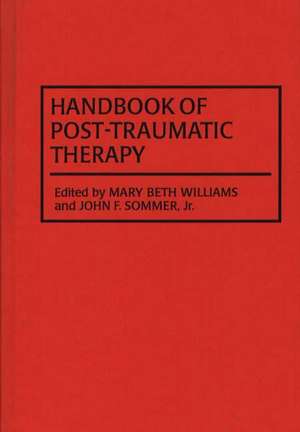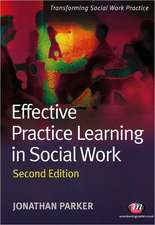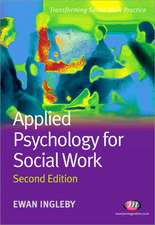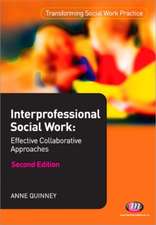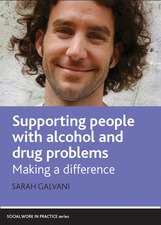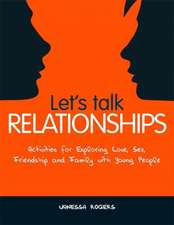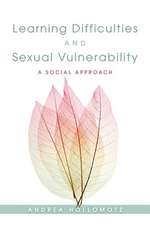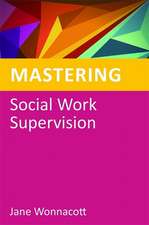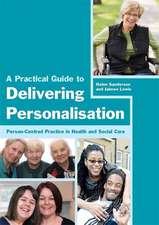Handbook of Post-Traumatic Therapy
Autor John F. Sommer, Marybeth Williamsen Limba Engleză Hardback – 29 sep 1994 – vârsta până la 17 ani
Preț: 294.12 lei
Preț vechi: 525.29 lei
-44% Nou
Puncte Express: 441
Preț estimativ în valută:
56.31€ • 58.53$ • 46.68£
56.31€ • 58.53$ • 46.68£
Carte tipărită la comandă
Livrare economică 05-19 februarie 25
Preluare comenzi: 021 569.72.76
Specificații
ISBN-13: 9780313281433
ISBN-10: 0313281432
Pagini: 656
Dimensiuni: 156 x 235 x 40 mm
Greutate: 1.08 kg
Editura: Bloomsbury Publishing
Colecția Greenwood
Locul publicării:New York, United States
ISBN-10: 0313281432
Pagini: 656
Dimensiuni: 156 x 235 x 40 mm
Greutate: 1.08 kg
Editura: Bloomsbury Publishing
Colecția Greenwood
Locul publicării:New York, United States
Notă biografică
Mary Beth Williams is a private practitioner in the Trauma Recovery Education and Counseling Center in Warrento, Virginia, and a school social worker in Falls Church, Virginia. She has conducted research with sexual abuse survivors, and received her PhD in human and organizational systems development from the Fielding Institute in Santa Barbara, California. Her recent publications include Violence Hits Home: A Sourcebook on Treatment of Family Violence (1990) and many professional journal articles on post-traumatic stress disorders.John F. Sommer, Jr. is executive director of the Washington, D.C. Office of The American Legion. He has co-authored articles and facilitated research projects dealing with Agent Orange effects on Vietnam Veterans. He has been involved in ongoing POW/MIA investigations, has testified before Congressional Committees, and has made three recent trips to Vietnam and other areas of Southeast Asia. He is a member of the International Society for Traumatic Stress Studies, and is co-chair of the Ethics Task Force/Committee of ISTSS. He has presented nationally on a variety of trauma-related topics. Mr. Sommer served in the U.S. Army in Vietnam as a combat medic, and Noncommissioned Officer in Charge of a Battalion Station. He currently chairs the Department of Veterans Affairs Advisory Committee on the Readjustment of Vietnam and Other War Veterans.
Cuprins
PrefaceTheoretical, Diagnostic, and Practical ApproachesThe Need for an Integrative Theory of Post-Traumatic Stress Disorder by John P. WilsonThe Diagnosis and Assessment of Post-Traumatic Stress Disorder in Adults by Brett T. Litz and Frank W. WeathersIntegrating Structured and Unstructured Approaches to Taking a Trauma History by Laurie Anne Pearlman and I. Lisa McCannTreatment of Children and FamiliesLong-Term Treatment for Children with Severe Trauma History by Beverly JamesIntervention with Child Victims of Trauma in the School Setting by Mary Beth WilliamsDual, Triple, and Quadruple Trauma Couples: Dynamics and Treatment Issues by Aphrodite MatsakisTreatment Itimacy Issues of Traumatized People by Patricia L. SheehanIntergenerational Consequences of Trauma: Reframing Traps in Treatment Theory--A Second Generation Perspective by Joseph H. AlbeckTreatment of Survivors of Violence and AbuseClinical Treatment of Survivors of Homicide Victims by MaryDale SalstonPost-Traumatic Therapy with Domestic Violence Survivors by Mary Ann DuttonEstablishing Safety in Survivors of Severe Sexual Abuse by Mary Beth WilliamsTreatment of Victims of WarTreatment of War-Related Trauma: An Integrative Experiential, Cognitive, and Spiritual Approach by Raymond Monsour ScurfieldWar-Related Post-Traumatic Stress Disorder: Chemical Addictions and Non-chemical Habituating Behaviors by Lori R. Daniels and Raymond Monsour ScurfieldTreatment of Victims of Ethnocultural and Political ProblemsPost-Traumatic Ethnotherapy (P-TET): Processes in Assessment and Intervention in Aspects of Global Psychic Trauma by Erwin Randolph Parson"That Which Does Not Destroy Me": Treating Survivors of Political Torture by Barbara ChesterTreatment of Post-Traumatic Stress Disorder in the Arab-American Community by Nuha AbudabbehTreatment of Disaster VictimsImmediate Post-Disaster Treatment of Trauma by William C. ForemanResponding to Community Crisis by Marlene A. Young and John SteinRelocation: Treatment of a Family Crisis by Judith HalpernThe Association of Flight Attendants Employee Assistance Program Responds to Workplace Trauma: A Dynamic Model by Barbara FeuerTreatment of Work-Related Trauma in Police Officers: Post-Traumatic Stress Disorder and Post-Traumatic Decline by Berthold P. R. Gersons and Ingrid V. E. CarlierCreative Therapeutic ApproachesArt Therapy as a Visual Dialogue by Dee SpringCreative Arts Therapies on a Sanctuary Voluntary Inpatient Unit for Men and Women Who Have Experienced Abuse and Psychological Trauma in Childhood by Jean VogelThe Use of Writing in the Treatment of Post-Traumatic Stress Disorder by Susan C. Feldman, David Read Johnson and Marilyn OllayosAction-Based Therapy for PTSD by Cynthia M. StuhlmillerHypnotic Approaches in Treating PTSD: An Ericksonian Framework by Robert A. SchwarzSpecial Group Interventions for Trauma SurvivorsA Twelve-Theme Psycho-Educational Program for Victims and Survivors by Joel Osler BrendeGroup Therapy and Self-Help Groups for Adult Survivors of Childhood Incest by Jeremy Herman and Lana R. LawrenceThe Development of Groups for Partners of Survivors of Child Sexual Abuse by Wendi R. KaplanDeveloping An Inpatient Dissociative Disorder Unit by Christine A. Courtois, Barry M. Cohen, and Joan A. TurkusThe Sanctuary Model: Developing Generic Inpatient Programs for the Treatment of Psychological Trauma by Sandra L. BloomNew Trends and DevelopmentsBiological and Pharmacological Aspects of the Treatment of PTSD by Matthew J. FriedmanTraumatology: Implications for Training, Education, and Development Programs by David P. NilesEthical Considerations in Trauma Treatment, Research, Publication, and Training by Mary Beth Williams, John F. Sommer, Jr., B. Hudnall-Stamm, and C. J. HarrisCountertransference and Trauma: Self-Healing and Training Issues by Yael DanieliToward the Development of a Generic Model of PTSD Treatment by Mary Beth Williams and John F. Sommer, Jr.ReferencesIndex
Recenzii
[An] excellent handbook that provides a comprehensive and in-depth look at PTSD. Williams and Sommer create a conceptual framework for diagnosing, treating, and assessing post-traumative stress in survivors of violence, abuse, war, political torture, and disaster. Chapters are devoted to creative therapies, group interventions, and several new trends.
[T]he usefulness of the book is immediately obvious because of the comprehensiveness of the topics covered, and the wealth of accumulated experience and knowledge of the contributing authors. The book should be read by anyone interested in or practicing in the field of psychological trauma or traumatic stress recovery. . . . The impact of the book upon the field of traumatology will be one of educational value. That is, there are now volumes of theories, hypotheses, research, and opinions about the causes and treatment of post-traumatic stress, but few works which include the vast accumulation of practical experience and knowledge gathered in this book. It provides an opportunity for the many isolated practitioners to compare their knowledge and techniques with those of the experts in the field, and then decide what methods may be most effective in the treatment of their trauma survivors.
[An] excellent handbook that provides a comprehensive and in-depth look at PTSD. Williams and Sommer create a conceptual framework for diagnosing, treating, and assessing post-traumatic stress in survivors of violence, abuse, war, political torture, and disaster.
[T]he usefulness of the book is immediately obvious because of the comprehensiveness of the topics covered, and the wealth of accumulated experience and knowledge of the contributing authors. The book should be read by anyone interested in or practicing in the field of psychological trauma or traumatic stress recovery. . . . The impact of the book upon the field of traumatology will be one of educational value. That is, there are now volumes of theories, hypotheses, research, and opinions about the causes and treatment of post-traumatic stress, but few works which include the vast accumulation of practical experience and knowledge gathered in this book. It provides an opportunity for the many isolated practitioners to compare their knowledge and techniques with those of the experts in the field, and then decide what methods may be most effective in the treatment of their trauma survivors.
[An] excellent handbook that provides a comprehensive and in-depth look at PTSD. Williams and Sommer create a conceptual framework for diagnosing, treating, and assessing post-traumatic stress in survivors of violence, abuse, war, political torture, and disaster.
